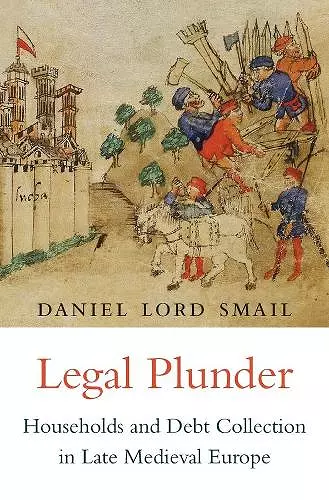Legal Plunder
Households and Debt Collection in Late Medieval Europe
Format:Hardback
Publisher:Harvard University Press
Published:30th Jun '16
Currently unavailable, and unfortunately no date known when it will be back

As Europe began to grow rich during the Middle Ages, its wealth materialized in the well-made clothes, linens, and wares of ordinary households. Such items were indicators of one’s station in life in a society accustomed to reading visible signs of rank. In a world without banking, household goods became valuable commodities that often substituted for hard currency. Pawnbrokers and resellers sprang up, helping to push these goods into circulation. Simultaneously, a harshly coercive legal system developed to ensure that debtors paid their due.
Focusing on the Mediterranean cities of Marseille and Lucca, Legal Plunder explores how the newfound wealth embodied in household goods shaped the beginnings of a modern consumer economy in late medieval Europe. The vigorous trade in goods that grew up in the fourteenth and fifteenth centuries entangled households in complex relationships of credit and debt, and one of the most common activities of law courts during the period was debt recovery. Sergeants of the law were empowered to march into debtors’ homes and seize belongings equal in value to the debt owed. These officials were agents of a predatory economy, cogs in a political machinery of state-sponsored plunder.
As Daniel Smail shows, the records of medieval European law courts offer some of the most vivid descriptions of material culture in this period, providing insights into the lives of men and women on the cusp of modern capitalism. Then as now, money and value were implicated in questions of power and patterns of violence.
A terrific book, rich with well-told anecdotes as well as smart analytical interventions. Smail makes ordinary people more than mere onlookers or victims of the long so-called commercial revolution of Europe. -- Martha Howell, Columbia University
Full of unexpected insights, this exciting and innovative social history brings the late Middle Ages to life through everyday objects that served as the basis of an emotional package of vanity, optimism, humiliation, and violence surrounding debt seizures. -- Paul Freedman, Yale University
Fascinating and highly original. Smail writes with great fluency, a distinctive voice, and disarming charm. He has a gift for using understudied sources to analyze fresh and important questions. -- Carol Lansing, University of California, Santa Barbara
A magisterial examination of the transformation of the medieval economy. While the entire book is remarkably insightful and erudite, the chapters on the excessive acts of the state against its citizens and the concomitant violent resistance are particularly brilliant. -- Teofilo F. Ruiz, University of California, Los Angeles
Legal Plunder is only partly about the exploration of grand interpretive ideas using a medieval case study. The book will also stimulate readers interested primarily in debates about the economy, society and culture of late medieval Europe. Its main conclusions will surely excite discussion and further exploration. -- Christopher Briggs * History Today *
A massive historical undertaking that sheds considerable light on wealth and credit in medieval Europe. -- S. Pressman * Choice *
Daniel Lord Smail’s fascinating Legal Plunder: Household and Debt Collection in Late Medieval Europe shows that ‘offshore’ or private money creation (i.e. credit) played a significant part even in the Middle Ages. -- Rebecca L. Spang * Times Literary Supplement *
- Nominated for James Willard Hurst Prize 2017
- Nominated for Peter Gonville Stein Book Award 2017
ISBN: 9780674737280
Dimensions: unknown
Weight: unknown
344 pages